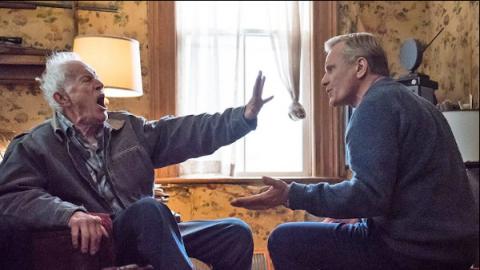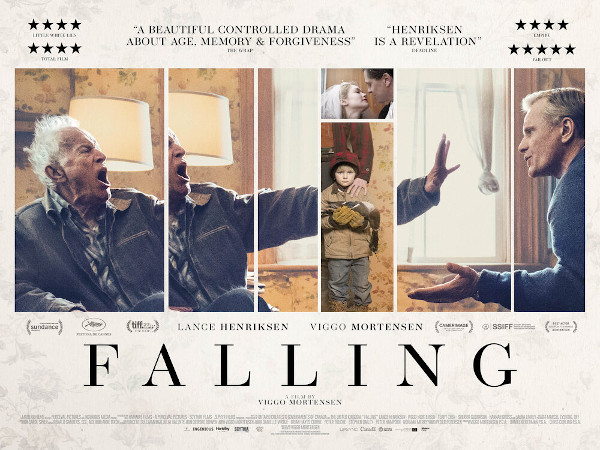Viggo Mortensen Debuts ‘Falling,’ a Strange but Powerful Film About a Dysfunctional Family

On the surface, Falling, Viggo Mortensen’s screen debut as a writer-director, looks like maudlin fluff designed to tick all of the Trendy Indie boxes.
John, a gay man (Mortensen), must help Willis, his homophobic father with dementia (Lance Henriksen), sell the family farm. As a result, John, his Chinese-American husband, and their young Hispanic daughter are forced to endure nonstop slurs and constant belittling from the old man who’s losing his grip on reality. Even the film’s poster seems to point at a predictable dramatic question common to the victim narrative: Does Willis ultimately learn to accept his son for who he is?
This is the Trojan horse Mortensen uses to craft a much deeper and searching story. Falling doesn’t toss out easy answers or condescend to the viewer with oversimplified conclusions. Rather, Mortensen offers an evenhanded ode to the complexity of experience, love, and memory itself while exploring the problems presented by all of these things.
The movie splashes memories into the present to illustrate the stickiness of the past. The technique of intercutting past and present is risky, and it can easily feel contrived and ham-fisted. But here, thanks in part to the stellar editing of Ronald Sanders (David Cronenberg’s editor), the technique enhances the story Mortensen’s getting at. (Cronenberg, a friend and past collaborator of Mortensen’s, has a welcome, winking cameo as a proctologist.)

As William Faulkner once wrote, “The past is never dead. It’s not even past.” The ever-present impact of John and Willis’s history together shapes their present-day interactions in the most unusual, often profound, ways. There’s a deliberate wooziness that sort of collapses the characters’ lives into an ouroboros of experience. Time occurs in a circle instead of a straight line in Falling, and that approach feels exactly right for the narrative. Everything is knotted together in a way that feels very authentic. In some regards, it’s the end goal that someone like Terrence Malick is always striving for and mostly failing to achieve.
Even though the timeline is both clearly defined but meaningfully elastic, the movie feels hyperrealistic. You could argue that the scenes feel a bit stagnant and redundant; the same cycle of dynamics plays out again and again. Willis insults everyone in sight and spits out vulgarities while his family must find casual ways to either ignore or deflect these provocations. And there’s not much dramatic variety between these scenes, which make up most of the movie.
However, by the end of the film, it’s clear to me that the viewer is being subjected to John’s life experience. In order for John’s final confrontation with his father to have the gutwrenching emotional power that it has, you have to attain firsthand knowledge of what it feels like to deal with this old jerk — day in and day out — for your whole life. Mercifully, this isn’t a mini-series: it’s a taut hour and 45 minutes — just long enough to give you the grief of Willis’s indefatigable cruelty without completely wiping you out.
Another startling aspect of Willis is the depth of his character. He’s thoroughly nasty, but he also emerged as somewhat of an obscene poet at times. His interactions with his granddaughter are intimate and genuine — even warm. There are several moments when the raw pain of his humanity leaks through his facade. Henriksen, at age 80, hasn’t lost one ounce of his fire-and-brimstone intensity. It’s a treat watching a maestro like Henriksen bring his unique sense of conviction and pathos to a part that made him say, in an interview, “I thought I was gonna be burned at the stake when the movie was over.”

Overall, Falling exhibits many of the same characteristics that Mortensen displays as an actor. The film tempers undeniable masculinity with an uncommon sensitivity and tenderness. There’s a sense of patience and introspection bubbling beneath the surface. The peculiar rhythm of the scenes has a disarming quality that keeps you engaged. You wait for sparks to fly; when they finally do, the screen goes ablaze.
There are missteps with Falling, but they’re not fatal. Frankly, I’m just grateful someone — a Hollywood star, no less — is making interesting, out-of-the-ordinary movies like this. This isn’t a “neat” film. It’s messy and brazen and strange and, in the end, quite powerful and heartbreaking. In fact, it mirrors life itself and is designed to do so. It’s especially encouraging to see a movie like this arise from the wasteland of 2020, the year when, as far as I can tell, the artform of film finally officially died.
Author Bio:
Christopher Karr is a contributing writer at Highbrow Magazine.
For Highbrow Magazine
































































































































































































































































































































